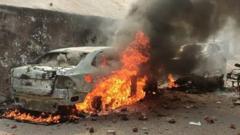Sambhal, a city in Uttar Pradesh, is under heightened alert following violent clashes between protesters and police that led to three fatalities on Sunday. The disorder erupted during a court-monitored survey of the Jama Masjid, a mosque built during the Mughal era, after a petition claimed it is situated on the ruins of a demolished temple.
Authorities have reported detaining 21 people linked to the incidents and have suspended internet services while schools in the region were closed for a day to prevent further escalation. The survey was ordered by a local court just hours after receiving the petition, alleging that the mosque was constructed after Mughal ruler Babur destroyed a temple in the 1520s.
Videos circulating on social media depict the chaotic aftermath, with debris from slippers, bricks, and stones scattered around the mosque's premises. Protesters accused police of firing live rounds, resulting in injuries and fatalities, a claim the authorities have refuted. Superintendent of Police Krishan Kumar clarified, "No weapons were used that could take anyone's life."
Tensions had been simmering in Sambhal since the court's survey order. Following the initial survey, a second attempt on Sunday led to unrest as a large crowd gathered, resulting in violent confrontations with law enforcement. Police stated that stones were hurled at them, necessitating the use of tear gas and plastic bullets to control the situation.
In the wake of the violence, critics of the ruling Bharatiya Janata Party (BJP) accused the government of instigating unrest for political reasons, a claim that has been denied by state officials. Uttar Pradesh's Deputy Chief Minister Brajesh Pathak emphasized, "No one is allowed to take law into their own hands" while calling for a thorough investigation into the disturbances.
Mahmood Madani, head of Jamiat Ulama-i-Hind, strongly denounced the ongoing mosque-related disputes, urging adherence to Indian laws to maintain communal harmony.






















